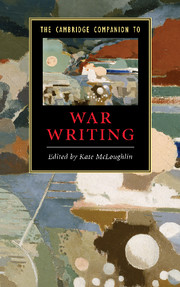Book contents
- Frontmatter
- Introduction
- Part I Themes
- Part II Influences
- Part III Poetics
- 8 Medieval warfare
- 9 Early modern war writing and the British Civil Wars
- 10 The eighteenth century and the romantics on war
- 11 American Revolutionary War writing
- 12 The Victorians and war
- 13 The American Civil War
- 14 The First World War: British writing
- 15 The First World War: American writing
- 16 The Spanish Civil War
- 17 The Second World War: British writing
- 18 The Second World War: American writing
- 19 American writing of the wars in Korea and Vietnam
- 20 The Cold War and the “war on terror”
- Index
17 - The Second World War: British writing
from Part III - Poetics
Published online by Cambridge University Press: 28 January 2010
- Frontmatter
- Introduction
- Part I Themes
- Part II Influences
- Part III Poetics
- 8 Medieval warfare
- 9 Early modern war writing and the British Civil Wars
- 10 The eighteenth century and the romantics on war
- 11 American Revolutionary War writing
- 12 The Victorians and war
- 13 The American Civil War
- 14 The First World War: British writing
- 15 The First World War: American writing
- 16 The Spanish Civil War
- 17 The Second World War: British writing
- 18 The Second World War: American writing
- 19 American writing of the wars in Korea and Vietnam
- 20 The Cold War and the “war on terror”
- Index
Summary
Unlike the First World War, Britain's Second World War did not have, nor has it acquired, a hegemonic setting. Vera Brittain and Stephen Spender both thought that the no-man's-land of their war, its “background,” was the bombed city, an equation that is fulfilled in the extraordinary air-raid climax to James Hanley's novel No Directions (1943). All three writers were civilians (Spender volunteered in the Auxiliary Fire Service). That their writing from wartime London has moral and historical authority says a good deal about the heterogeneity of the literary record of the Second World War, and the variety of possibilities for reading it. This is thrown into relief by comparisons with the writing of the First World War, which is still appraised largely in terms of the values and experience of the combatant.
It was claimed that the literature of the Second World War would only repeat that of the First World War (Keith Douglas, in “Desert Flowers,” a poem paying homage to Isaac Rosenberg); that it would only be “created after war is over” (Douglas again); and even that the war “will have no literature” (a character in Elizabeth Bowen's 1941 story “Sunday Afternoon”). Robert Graves thought it unlikely poets would “write horrifically about it,” given broad assent to the struggle against Nazi Germany. Later it would become a convention that writing of the Second World War was inferior to that of the First, an act both of forgetfulness, as Alun Munton has pointed out, and of presumption about what war writing should be like.
- Type
- Chapter
- Information
- The Cambridge Companion to War Writing , pp. 197 - 211Publisher: Cambridge University PressPrint publication year: 2009
- 4
- Cited by

